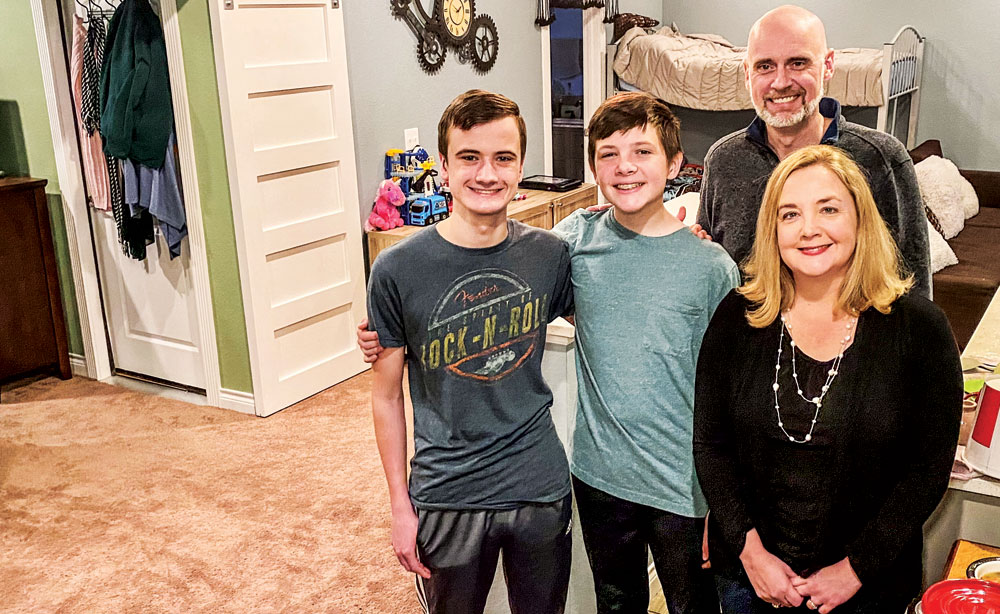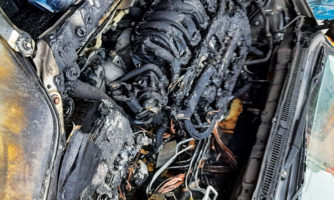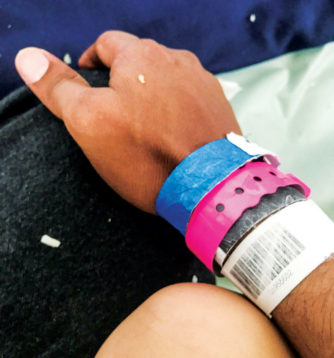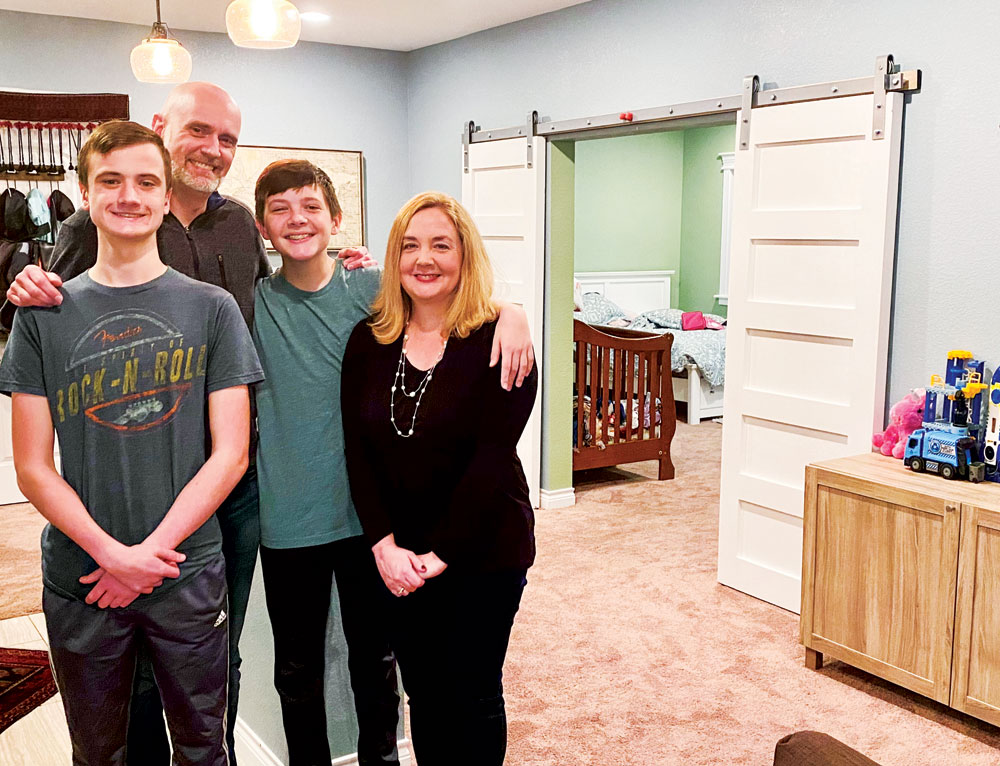
Jim, Kristy, Joey (16), and Charlie (13) Crooks say opening their home to complete strangers has been easy. “I grew up in a big family,” says Kristy. “It always felt like the more people, the better. My mom always said, ‘Where there’s room in the heart, there’s room in the home.’”
![]()
It was a hot afternoon in Kabul when the Taliban threw a bomb under Mohammed’s car, engulfing his family in flames. Mohammed had noticed a silverish ‘97 Toyota Corolla in his rear view. When he turned, the car turned. Still he didn’t think much of it. “We were on our way to drop my brother and his whole family at their grandparents’ house. The kids were thirsty, so I stopped to get juice. That’s when the store clerk yelled, ‘Your car’s on fire!’ You kind of lose consciousness,” he says about what came next. “We tried to roll the car into a nearby car wash to put out the flames. This is where we broke the glass to get the kids out,” he says handing over a picture.

The charred remains of Mohammed’s car after it was set on fire in a terrorist attack.
Mohammed can only guess as to why he was targeted. “I was working as a project manager on the third floor of a building. There were other guys—fundamentalists—who worked in the same building. They would call for afternoon prayer, and I didn’t always go. I dunno. I think that’s maybe why,” he says.
By midsummer, there were murmurings in the street, rumors the president was going to come on TV and resign. “I was in my office when a colleague popped in and said, ‘Get out!’ I called my brothers and told them to close the store; told them I was on my way.”
The short trip from Mohammed’s office to his family’s carpet and jewelry store held ominous signs. The streets of Kabul, usually bustling and beeping with gnarly traffic, were eerily quiet. Mohammed saw a leery Afghan soldier dip behind a wall to change from his military fatigues into civilian clothing. A cop car with its doors open, sirens still wailing, sat askew on the curb. By the time Mohammed and his brothers returned home, fires had broken out. There were gunshots and looting. People were saying that the Taliban had entered Kabul from the west; they had invaded the Palace.

After Mohammed’s visa was approved, his wristband showed he had a seat on the flight.
“I honestly don’t know how many times my brothers and I went to the airport,” says Mohammed. “You almost give up. We had all the proper documents, but we needed to get close to somebody, to one of the soldiers, but every time we went, my four-year-old would cry because they were doing this,” Mohammed says spraying an invisible arc of bullets into the air, “ya know to break the crowds, so it was hard. I got a call in the middle of the night. They said, ‘I know you have proper documentation. If you take another person with you, someone will come to your door, and you can go.’ I wasn’t going to do that,” says Mohammed. “If that was the only way, there was no way.” Mohammed tried one more time to breach the crowd leaving his wife Aadela, four children and nephew waiting outside on a rug. I had our passports open. A U.S. soldier spotted my visa stickers. That’s the only reason he chose me,” says Mohammed who was plucked from the chaos. After checking his documents several times, one U.S. Soldier told Mohammed to hold onto his backpack while another held Mohammed’s back and they sandwich-walked him back to the rug to collect his family. His nephew was punched in the stomach and a girl tried to fall in with their group. “I yelled at the soldiers, ‘We are seven! We are seven! I do not know her!” The next days and months passed in a haze. They traveled from Kabul to Qatar to Germany to Virginia and finally landed in Denver.
Halfway across the world, Central Park epidemiologist Jim Crooks saw a LinkedIn post from an old college buddy. He had a friend trapped in Afghanistan and was wondering if anyone could host them. “It’s funny,” says his wife Kristy, a genetics lab director and assistant professor at the University of Colorado. “We didn’t even discuss it. We just looked at each other and were like, ‘We’re gonna do this, right?’ ‘Yeah, definitely.’ And that was it.”

The Crooks in their basement apartment where Mohammed and his family live. Kristy says community support was overwhelming. They paid for a storage unit through December, so they could move their stuff out to make room. Mario, from Infinity Carpet Care cleaned the carpets for free.
![]()
Kristy says the support they received was overwhelming. “I think my post on a Central Park moms’ group received over 300 comments. People paid for a storage unit through December. I needed a high chair; eight people offered high chairs. I asked for two baby gates. I got 12. We got carseats and boosters, and all kinds of people dropped off clothes and toys. Almost all the furniture in the basement—the bunk beds, the cribs, the queen bed with storage underneath— was donated. I actually had to make an Excel spreadsheet so I could keep track of who was dropping off what. Next we asked if people would come help us assemble furniture,” says Kristy. “It was kinda a party atmosphere. All these people showed up with power tools, like burly men just there ready to assemble a bed or run to Home Depot for more screws or whatever we needed. It was amazing.”
The most surprising thing,” says Kristy, “is how easy it’s been. After we agreed to it, we talked a lot as a family, and we said, ‘This is going to be hard. These people are going to eat differently, and pray differently, and be different than us. This is going to be a challenge.’ But I was wrong. After like a week, it felt like family even though I can’t talk with half of them.” Food has become a kind of language. “Aadela doesn’t speak English,” says Kristy. “And I don’t speak Dari or Persian, so most of the time we just bond through cooking. One of us will be kneading bread, and the other one will take the other half and start kneading it or roll biscuits up or whatever.”Kristy says.
A few weeks ago after Mohammed and his family had been with them for a few months, he told Kristy how grateful he was and asked how long they could stay. “It’s funny,” says Kristy, “because we didn’t even discuss it. We just looked at each other and were like, ‘Indefinitely?’ ‘Yeah, indefinitely.’”
Pseudonyms were used at the family’s request.
Front Porch photos by Christie Gosch




You know what’s even better than hosting an Afghan family? Doing so without drawing a lot of attention to it; or perhaps publishing an article about the family who fled a brutal, murderous regime in the nick of time. Or perhaps, focusing the article on the failure of the U.S. government to evacuate our allies. But this article? It has the stain of white saviors written all over it. C’mon Front Porch. Do better.
Yes, the failures of the evacuation could be a whole story, but it is widely available by news organizations far better equipped to cover it than we are. And we did tell the story of an Afghan family who fled for their lives, but due to fears for their own safety, they asked to be anonymous.
We appreciate that you took the time to write. Criticism and sharing of views by readers makes a paper better. We hope you won’t hesitate to comment in the future and we’ll listen and consider whether and how we could’ve done better. But in this case we respectfully take issue with your characterization of the Crooks family as having “the stain of white saviors.” They simply responded to a plea for a host family. They didn’t come to us asking for a story. When we reached out, they put us off for months until the Afghan family was settled and comfortable being interviewed, albeit anonymously. Kristy Crooks’ didn’t take the credit for converting her basement. Her first words were about how all the neighbors pitched in.
We made a journalistic decision to tell two stories: what the Afghan family went through and the human response of people in our community. You seem to be saying it would have been fine to print just the Afghan family’s story, but it was wrong to write about the host family and reveal their identity. We disagree. Following your logic, stories about local people contributing to the community would all have to be anonymous to avoid “the stain of white saviors.” A newspaper wouldn’t last long that way. A big reason people like community papers is that the stories are local and the people in the stories live in their community.